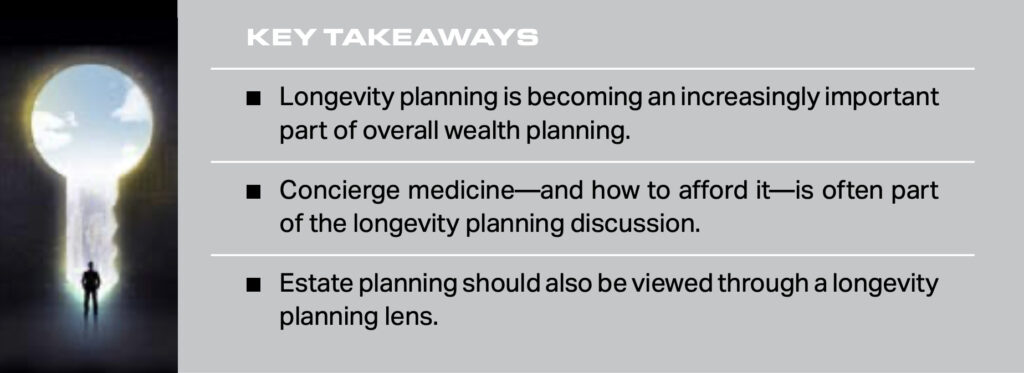Posted on: July 25th, 2022

“Here’s to a long life, and a merry one…”
So begins a well-known Irish toast—and it’s one that’s becoming more relevant than ever. In general, we’re living longer than ever and—thanks to medical technology advances—in better health than our ancestors.
Some experts—like Harvard University Professor of Genetics David Sinclair, author of Lifespan: Why We Age—And Why We Don’t Have To, even proffer that “there is no biological limit, no law that says we must die at a certain age” and that “we’re probably still a long way off from a world in which death is a rarity, but we’re not far from pushing it ever farther into the future.”
On one hand, that’s great news. After all, why wouldn’t you want to stick around for as long as you can—especially if you’re feeling fit and active?
But it also presents a challenge: planning financially for golden years that might extend to age 90, 100—or even longer. If you tack on an additional ten or 15 years to your life, you could face the very real and dangerous risk of running out of money while you’re still alive—or having so little left that your lifestyle becomes seriously compromised.
Why? For one, major medical bills and rising health care costs could eat away at your savings. Also, your financial plan could fail to take into account golden years that last for 35 or 40 years.
The good news: Longevity planning is becoming an increasingly important part of successful families’ wealth management efforts to combat the risks inherent in living much longer than previous generations did. Essentially, longevity planning is about taking action to live longer. But those actions lead to other issues, including financial ones—which is where wealth management comes into play.
Here’s a look at two ways wealth management is being used by the affluent to help ensure their wealth is well-positioned to go the distance.
Any discussion of funding a longer life should involve the topic of paying for medical care, so that you and loved ones can continue to have lives that are not just extended but also healthy.
Of course, the medical care landscape is changing at a rapid pace. The traditional health care system is very unlikely to be able to keep up with demand, and there is great potential for people to fall between the cracks.
For those who are concerned, and who can afford it, concierge medicine can be a viable solution.
Essentially a broad term covering a wide variety of health care delivery models, concierge medicine is at its core a membership model: For a fee, you get access to “boutique” medical practices with relatively small ratios of patients to physicians—enabling shorter wait times, longer visits and significantly more personalized care given (in many cases) by physicians with greater expertise than the typical provider has.

The problem: High-quality concierge medicine can be extremely costly, depending on the care needed and the providers.
Therefore, the ability to use wealth management solutions to address the potential costs of concierge health care and specialized medical care can be extremely valuable—even to those of us with significant wealth. Consequently, some of the foremost wealth managers, accountants and attorneys are working with families to make certain that their financial and legal world is set up to benefit from high-quality longevity planning.
Consider the following examples of health care issues and how wealth management solutions can help support the use of concierge medicine to address those issues.
Scenario 1: Consider a wealthy family with more than $30 million in net worth, most of which is tied up in their family business and illiquid. A family member requires costly, state-of-the-art treatments that are available only in a foreign country, as well as significant post-treatment rehabilitation. Being able to financially prepare for such a situation through genomic testing can be instrumental in preserving the family business and ensuring the family member gets the best medical care possible. In that case, advanced use of certain forms of insurance can potentially address the health care needs in tax-efficient ways.
Scenario 2: Because people are living longer and more active lives, individuals can run out of money. With medical costs likely to continue to rise and age working against you, you need to manage financial assets in a way that accounts for much longer life spans and ensures a long and well-lived life. As an investor, it’s all about how much you walk away with—not necessarily how much you earn. A great-performing investment can become mediocre after taxes. There are, however, ways to mitigate the tax bite from a variety of investments—for example, by using certain types of life insurance to reduce taxes.

Estate planning is another key aspect of longevity planning. Due to longer life spans, people and families may need to rethink their existing estate plans and even their entire mindset about wealth transfer. Indeed, the potential to live much longer can create an estate planning minefield for wealthy families as well as their wealth managers and tax experts.
Specifically, we’re seeing significant issues develop for high-net-worth families in terms of how and when to transfer assets to subsequent generations.
For example, among many wealthy families, a critical longevity-related question must now be asked: “When does the next generation get to benefit from and control the assets they are intended to have?”
If a successful business owner, for instance, expects to live past 100 thanks to medical advances, when do the inheritors take control of the family-owned and -managed company? Is it in their 70s? 80s? 90s? Potentially disastrous family confrontations could arise from not thinking through the possibilities and being proactive. Consider one example of a family business where the son was in his early 50s and his father (the founder) was in his early 80s. The son had expected to take over the business years ago—but his father, who was in good health, had no intention of stepping down. Fed up, the son left to start a competing firm. Ultimately, this led to threats of physical harm, lawsuits and a split within the family that negatively impacted the owner’s relationship with his grandchildren.
Controlling wealth until death is a common practice among self-made millionaires. But this philosophy can lead to poor estate plans, especially when the people involved live a long time. In cases where the wealth holders are living a very long time, it is their responsibility to construct estate plans that clearly spell out what is to happen.
Best practice: Often, it can be wise to transfer assets before death, which can head off lots of possible problems—such as family disputes, lawsuits and assets strangely disappearing. Shifting some wealth before death can also prevent problems if the wealth holder suffers dementia and is exploited by staff or even family members.
As you move forward, consider the following questions:
The fact is, with longevity planning garnering tremendous interest, elite wealth managers and aligned professionals are going to play critical supporting roles in areas like paying for concierge medicine and estate planning. The expertise of truly skilled wealth managers can be crucial in enabling those of us who are not stratospherically wealthy to afford top concierge medical practices as well as diagnostic or treatment regimens.
The real risk you face as you look to leverage longevity-focused wealth management solutions is mistakenly putting your trust in professionals who aren’t actually qualified to help you (Pretenders) or who use shaky solutions that could blow up on you down the road when you need those solutions to work for you (Exploiters).
If you are at all uncertain about your current advisor’s ability to address longevity-related threats to your financial well-being that may exist for 30 years or more, it’s wise to seek out a second opinion about your financial situation before you make decisions about your wealth that could impact your ability to pay for top-tier health care and plan your estate effectively. A comprehensive review of where you are today, where you want to be and the gaps between may indicate that it’s time to find the expertise that will truly add value to your life—and the lives of those you care about most.
Even if you have already taken action in these areas, it may be a good idea to get a second opinion—especially if you feel at all worried or uncertain about your plan. As we’re sure you’ll agree, addressing any problems with your current longevity planning efforts today is better than addressing them two decades from now, when it may be far too late to make corrections.
As another toast says: “May you live as long as you like, and have all you like as long as you live.” Longevity planning can potentially help make that statement less of a wish and more of an actual outcome.
This report was prepared by, and is reprinted with permission from, VFO Inner Circle. AES Nation, LLC is the creator and publisher of VFO Inner Circle reports.
Disclosure: The opinions expressed in this commentary are those of the author and may not necessarily reflect those held by Kestra IS or Kestra AS. The material is for informational purposes only. It represents an assessment of the market environment at a specific point in time and is not intended to be a forecast of future events, or a guarantee of future results. It is not guaranteed by Kestra IS or Kestra AS for accuracy, does not purport to be complete and is not intended to be used as a primary basis for investment decisions. It should also not be construed as advice meeting the particular investment needs of any investor. Neither the information presented nor any opinion expressed constitutes a solicitation for the purchase or sale of any security. Securities offered through Kestra Investment Services, LLC (Kestra IS), member FINRA/SIPC. Investment advisory services offered through Kestra Advisory Services, LLC (Kestra AS), an affiliate of Kestra IS.
Fusion Wealth Management is not affiliated with Kestra IS or Kestra AS. https://www.kestrafinancial.com/disclosures
VFO Inner Circle Special Report
By Russ Alan Prince and John J. Bowen Jr.
© Copyright 2021 by AES Nation, LLC. All rights reserved.
No part of this publication may be reproduced or retransmitted in any form or by any means, includ- ing, but not limited to, electronic, mechanical, photocopying, recording or any information storage retrieval system, without the prior written permission of the publisher. Unauthorized copying may subject violators to criminal penalties as well as liabilities for substantial monetary damages up to $100,000 per infringement, costs and attorneys’ fees.
This publication should not be utilized as a substitute for professional advice in specific situations. If legal, medical, accounting, financial, consulting, coaching or other professional advice is required, the services of the appropriate professional should be sought. Neither the authors nor the publisher may be held liable in any way for any interpretation or use of the information in this publication.
The authors will make recommendations for solutions for you to explore that are not our own. Any recommendation is always based on the authors’ research and experience.
The information contained herein is accurate to the best of the publisher’s and authors’ knowledge; however, the publisher and authors can accept no responsibility for the accuracy or completeness of such information or for loss or damage caused by any use thereof.
Unless otherwise noted, the source for all data cited regarding financial advisors in this report is CEG Worldwide, LLC. The source for all data cited regarding business owners and other professionals is AES Nation, LLC.